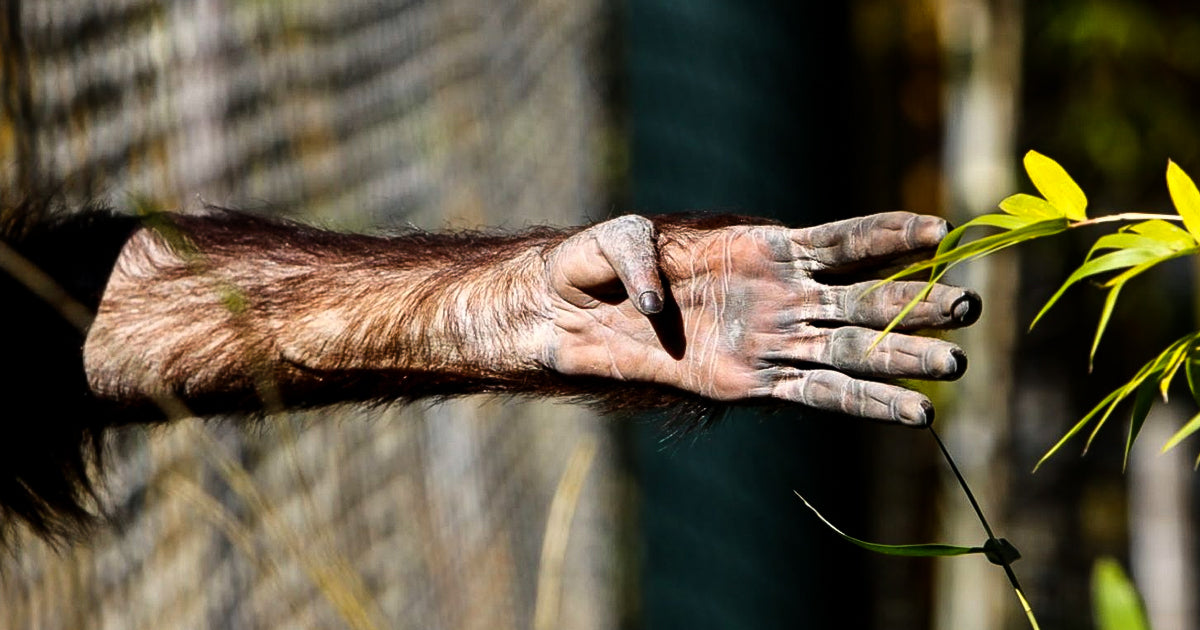How do you feel about zoos? A few decades ago, no one would have bat an eyelid before visiting one, but now people are far more conscious of the suffering they produce – so why do they still exist?
Suzi
Maybe we haven’t come as far as we think in terms of animal welfare…
Aside from that, we have hearty discussion on longevity of microbes, humans and reefs (in that order); and we bring you new content from friends of Think Inc., Dr. Cornel West and John McWhorter.
If you come across news that everyone should know about, send me a link to it via info@thinkinc.org.au and we might include it in the next edition!
Warm regards,
Suzi
THE LONGEST NAP EVER?

A microscopic rotifer has come back to life after spending the last 24,000 years frozen in hibernation!
A rotifer is a little worm-like aquatic animal known for their extreme survival skills, but this one has surprised even scientists with how durable it is.
It was found in the Siberian permafrost by Russian scientists, who published their findings in Current Biology. The more complex the organism, the trickier it gets to freeze and revive an animal.
What’s surprising is that rotifers have microscopic guts and brains, so this is a massive step forward! What will it mean for the future of cryonics? Maybe this tech could be used to revive frozen humans
LIFE AFTER DEATH

While we might not be able to live 24,000 years like the roitfer, Aussie scientist and ageing-expert, David Sinclair, believes we should be aiming to live at least 100 years, and that we'll likely see people get to 150 in our lifetime!
David recently appeared on Lex Fridman's podcast to talk about all things aging-related, including whether we can bring people back to life, at least artificially.
According to David, considering how much data we already collect about a person, it'll probably be possible in the future. This data could be used to create digital replicas of people – a much more plausible feat than time-travel.
We worked with David last September on our Outside the Box series, you can find all the videos on our YouTube channel.
David recently appeared on Lex Fridman's podcast to talk about all things aging-related, including whether we can bring people back to life, at least artificially.
According to David, considering how much data we already collect about a person, it'll probably be possible in the future. This data could be used to create digital replicas of people – a much more plausible feat than time-travel.
We worked with David last September on our Outside the Box series, you can find all the videos on our YouTube channel.
→ Click here to learn more.
HOW TO SAVE THE BARRIER REEF

The average pH of the world’s oceans is lowest it's been in about 800,000 years. This, combined with the rising temperature of the water, is creating widespread coral calcification, especially in the Great Barrier Reef.
To offset the acidification, scientists from the CSIRO have worked out that continuously dumping crushed Olivine onto the reef, and letting the current spread it, can return environment to its natural pH!
While this sounds like a simple and cheap solution to prevent further damage to the precious reef, some scientists are calling the idea as reckless, as we don't know what other consequences tinkering with the pH could produce.
According to the lead scientist of the study, Mathieu Mongin, researchers are being forced to consider radical interventions because of a lack of global action on the climate crisis.
To offset the acidification, scientists from the CSIRO have worked out that continuously dumping crushed Olivine onto the reef, and letting the current spread it, can return environment to its natural pH!
While this sounds like a simple and cheap solution to prevent further damage to the precious reef, some scientists are calling the idea as reckless, as we don't know what other consequences tinkering with the pH could produce.
According to the lead scientist of the study, Mathieu Mongin, researchers are being forced to consider radical interventions because of a lack of global action on the climate crisis.
→ Click here to learn more.
FAR FROM A ZOOTOPIA
Mahatma Gandhi said that "the greatness of a nation and its moral progress can be judged by the way its animals are treated".
Applying that criterion to today, how much moral progress have we made over the last two millennia? This is the topic Peter Singer writes about in his new article in Project Syndicate.
It discusses his latest book, the Golden Ass, which presents a very progressive view of animal ethics, considering it was written in 2nd century Rome where animals were being tortured for entertainment. But how far have we really come?
If Apuleius, the original author of the novel, was to return to his birthplace (in what is now Algeria), he would find no laws that protect animals from cruel treatment.
While most developed nations have laws against the torture of animals, animal suffering is often overlooked where commercial purposes are concerned. So, how great are we really?
Applying that criterion to today, how much moral progress have we made over the last two millennia? This is the topic Peter Singer writes about in his new article in Project Syndicate.
It discusses his latest book, the Golden Ass, which presents a very progressive view of animal ethics, considering it was written in 2nd century Rome where animals were being tortured for entertainment. But how far have we really come?
If Apuleius, the original author of the novel, was to return to his birthplace (in what is now Algeria), he would find no laws that protect animals from cruel treatment.
While most developed nations have laws against the torture of animals, animal suffering is often overlooked where commercial purposes are concerned. So, how great are we really?
→ Click here to learn more.

Zoos too are often overlooked when it comes to animal suffering.
In an opinion piece released in the New York Times last week, environmental writer Emma Marris argues that modern zoos are not worth the moral cost.
Not only is keeping wild animals in captivity cruel, but the killing of “surplus” animals is common practice but little discussed. Proponents of zoos will say that they educate the public and spark interest in biodiversity, but most people surveyed when entering zoos say they just want to have an entertaining experience.
Let's not pretend that zoos benefit animals in any considerable way. If people want to contribute to helping the environment, they would be better off considering the effective altruism model and donating money to an effective organisation like the Animal Welfare Fund, for example.
In an opinion piece released in the New York Times last week, environmental writer Emma Marris argues that modern zoos are not worth the moral cost.
Not only is keeping wild animals in captivity cruel, but the killing of “surplus” animals is common practice but little discussed. Proponents of zoos will say that they educate the public and spark interest in biodiversity, but most people surveyed when entering zoos say they just want to have an entertaining experience.
Let's not pretend that zoos benefit animals in any considerable way. If people want to contribute to helping the environment, they would be better off considering the effective altruism model and donating money to an effective organisation like the Animal Welfare Fund, for example.
→ Click here to learn more.
WEST & MCWHORTER UPDATE
Missing from the chat was another friend of Think Inc., John McWhorter.
We guess he was off doing other imporant things, like talking to to Dr Scott Barry Kaufman on The Psychology Podcast.
Our favourite linguist discussed his latest book, Nine Nasty Words, which explores the history and sociology of profanity.
We’re lucky to have such an experienced linguist and psychologist together because there’s so much interesting overlap across language and psychology – for example, when we swear or hear an offensive word, it triggers a reaction in the amygdala.
But they don’t stop at psychology and swearing! They also get into politics of course, debating the topics of racism, justice and victim mentality.
We guess he was off doing other imporant things, like talking to to Dr Scott Barry Kaufman on The Psychology Podcast.
Our favourite linguist discussed his latest book, Nine Nasty Words, which explores the history and sociology of profanity.
We’re lucky to have such an experienced linguist and psychologist together because there’s so much interesting overlap across language and psychology – for example, when we swear or hear an offensive word, it triggers a reaction in the amygdala.
But they don’t stop at psychology and swearing! They also get into politics of course, debating the topics of racism, justice and victim mentality.
→ Click here to learn more.
PICTURE OF THE WEEK

We Antipodeans are a bit jealous that we missed out on these incredible sights that our northern neighbours got to enjoy. Last Thursday those of you in the northern hemisphere were treated to a "ring of fire" solar eclipse – did you catch it?
This spectacular photo captured by Dmitri Lovetsky shows a bird passing in front of the Sun in St Petersburg, Russia. Not bad, huh?
This annular eclipse occurs when a new Moon is around its farthest point from Earth and appears smaller, almost like it's biting a chunk out of the Sun. This was the first eclipse of the Sun visible in North America since August 2017. The next is due in 2024!
This spectacular photo captured by Dmitri Lovetsky shows a bird passing in front of the Sun in St Petersburg, Russia. Not bad, huh?
This annular eclipse occurs when a new Moon is around its farthest point from Earth and appears smaller, almost like it's biting a chunk out of the Sun. This was the first eclipse of the Sun visible in North America since August 2017. The next is due in 2024!
→ Click here for more info.



Leave a comment
This site is protected by hCaptcha and the hCaptcha Privacy Policy and Terms of Service apply.